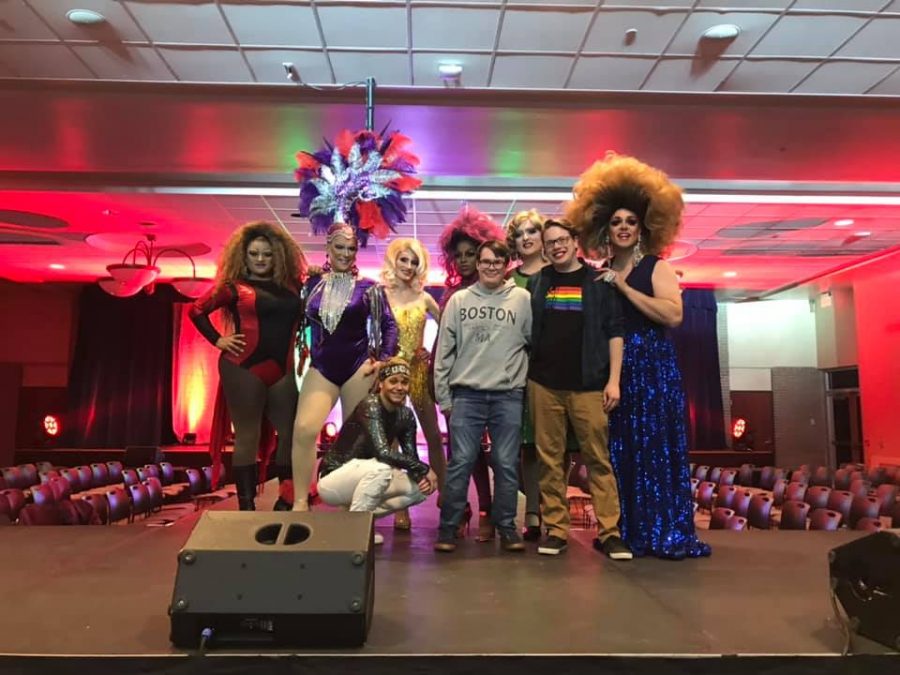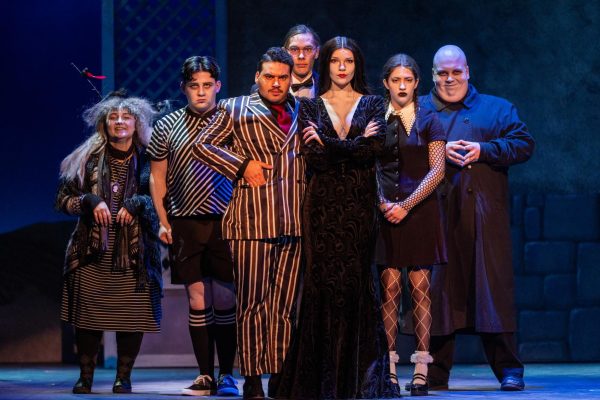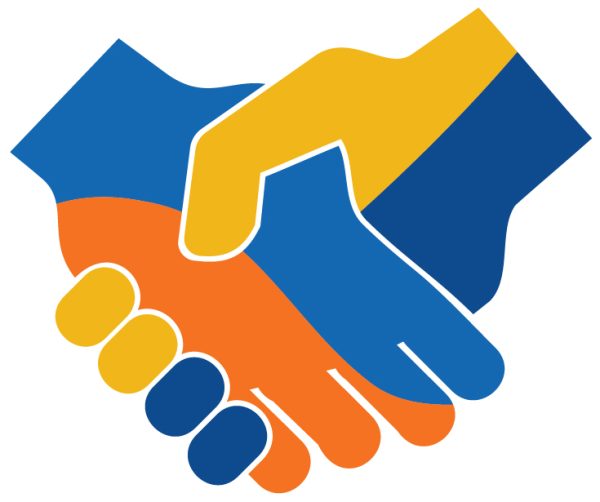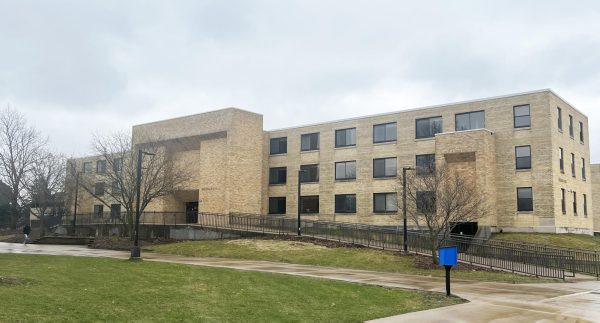Rainbow Rave: 10th anniversary celebration
UW-Platteville explores LGBTQ topics in times past – every day – next generation
Pictured here above performers and organizers from the tenth annual Rainbow Rave. Left to Right back row: Honey Love, Janelle Heart, Rylynn Vatile-Belle, Milange Cavalli, Roxi Heart (MC) and Kyra Vitale (MC) Left to right front row: Lucas Lee James, Bryant Copper and Jason Roth
This year’s Rainbow Rave Conference and Drag Show kicked off on Nov.16, with the theme Times Past – Everyday – Next Generation.
The day started with a pre-conference Ally training, something the Doyle Center does throughout the year. According to Elliott Parsons, Ally training mostly goes through the terminology relevant to the LGBTQ+ community; it teaches participants how to be a good ally.
Jason Roth, president of the Alliance, said that “because it was the tenth anniversary, we wanted to have an acronym. We wanted to look at past, present and future LGBTQ+ topics, and really dive into where we’ve been, where we are and where we’re headed. That’s really the goal of the five presenters today.” He added that the conference has been going on for longer than 10 years, starting at around 2005-2006. In 2009, a group of Alliance members brought a drag performance to campus.
The day-long conference started with several presentations on LGBTQ+ topics.
Robin Timm, a local business owner, gave the audience a queer perspective from the 60s to today.
Timm, born in 1957, remembers the Stonewall Riots in 1969 as the start of the gay revolution. She grew up in a suburb of Milwaukee during a very tumultuous time.
“I wasn’t really thinking about being gay, I was thinking about being safe,” Timm said.
Timm shared that, when she was young, she didn’t really care about dating. Rather, she was in blue jeans and flannels, “tumbling around with the boys.” She remembers when her best friend came out to her and asked her, “don’t you think their bodies are beautiful?”
“I wanted to date, but I couldn’t find anyone,” Timm said.
Timm later befriended Jerry Dreva and Bobby Lambert, members of the influential glitter rock group, Les Petite Bonbons. They were both drag queens.
“He [Dreva] taught me a lot about being queer,” Timm said.
For a time, Timm, her two younger brothers and Dreva were inseparable, going to all of the gay bars because the one lesbian bar was still too scary for her.
In college, she remembers seeing the “gay people’s union” sign in one of the buildings, but she never went.
When she moved to Baltimore after college for work, she met her first girlfriend.
“We didn’t really know the good side [of being gay], we had only seen the dark side,” Timm said.
Luckily, Dreva and her other friends helped her to see that being gay was much more than the danger that came with being out.
Timm shared that, back then, no one was as out and forward as they are now; it wasn’t safe. Finding someone was like a scavenger hunt for love.
Timm later joined the Peace Corps and was sent to Guatemala where she did some more soul searching. Since the Peace Corps is a branch of the military, one could not serve and be out at the same time.
After her time in Guatemala, Timm moved to Boston and met even more drag queens. She shared that hanging around with gay men was amazing; however, she still didn’t know who she was.
By chance, she moved back to a Milwaukee flat that just so happened to house “a whole slew of lesbians.” She held a brunch in 1991, and it was then that she saw the woman in the white coat who would become her wife.
Originally, they had a commitment ceremony, vowing to each other as life partners, but they did not legally wed until after same-sex marriage was legalized in Iowa in 2009, where they traveled to receive a marriage license.
“Jane is my wife, and I can say that now,” Timm said.
When Jane started working in Madison, Timm became a nurse here in Platteville for a while, until internal issues made her leave. She then started growing veggies and opened Driftless Market.
Timm shared how frustrating it was that, for a long time, Jane couldn’t cover both of their insurance. When they could finally apply for partnership, they did so.
“The county clerk was really happy for us, and that felt really good,” Timm said.
In her parting words, Timm told the audience to “feel your passion, and don’t be afraid. Go out and explore, don’t be afraid of people, and don’t be afraid to ask questions. If you are queer, come out! Come out loud and proud. It helps everybody.”
Dr. Travis Nelson, a political science professor and chair of the Social Science and Criminal Justice Department, presented on LGBTQ+ Rights and the Supreme Court.
“We still have a long way to go, but we have also made a lot of progress very quickly,” Nelson said.
He explained that, currently, same-sex marriage is legal in 28 countries. However, with all this progress, Nelson reminded us that homosexual acts are still outlawed in 72 countries, and are grounds for the death penalty in eight.
Nelson then highlighted the three Amendments that are frequently used in court cases regarding LGBTQ+ rights: the first, fifth and fourteenth.
Nelson started with One Inc. v. Oleson, the first openly gay “magazine of ideas” fighting for the right to distribute in the city of San Francisco. He then moved to Bowers v. Hardwick, where the Supreme Court upheld sodomy laws that were only applied to homosexual individuals.
In Boy Scouts v. Dale in 2000, a scout master was expelled from the Scouts for appearing in a pro – LGBTQ+ interview. In the end, the Supreme Court sided with the Boy Scouts on the grounds of “free speech logic.” Fortunately, The Boy Scouts eventually lifted their ban on gay people due to public push-back.
Obergefell v. Hodges in 2015 legalized same-sex marriage at the federal level nationwide.
“It was a very, very big decision,” Nelson said.
Masterpiece Cake Shop v. Colorado Civil Rights Commission was a complicated case in which the Supreme Court ruled in favor of a cake shop that refused to make a cake for a gay couple on the grounds of moral beliefs. However, the Supreme Court made it clear that this was not to be used as a precedent for future cases.
“Trans rights is the next step,” Nelson said.
He stressed the importance of keeping all the people who still need rights in mind, even while celebrating the progress that has been made.
Dr. Edina Haslauer, an assistant professor in the School of Education, presented on recognizing sexism and heterosexism in the life of children.
“Just because we have the laws doesn’t mean boom, society changes,” Haslauer said.
Her presentation focused on GLSEN’s 2017 National School Climate Survey. According to this survey, 60% of LGBTQ+ students felt unsafe at school. 35% missed at least one day of school due to feeling unsafe and 70% avoided extracurricular activities. Worse, 18% have changed schools because they felt unsafe. 70% experienced verbal harassment, 29% experienced physical harassment, and 12% experienced physical assault. Haslauer pointed out that 57% of these students reported experiencing sexual assault at school.
To make matters worse, 55% of these students said that they did not report any of the above incidences, and 60% said that they did report, but received no support or were told to “just ignore it.” Haslauer explained how the data proves this to be a civil rights issue because community members are being kept from success in education.
Haslauer had the audience break into smaller sections and provided each group with three different scenarios regarding gender socialization, gender nonconformity and sexual orientation. She then had the groups read through the scenarios and try to find the heart of the issue and propose possible solutions/courses of action.
Mitchel Burkholder, an alumnus of both UW-Platteville and Sigma Phi Epsilon, provided his insight on the importance of LGBTQ+ visibility, incorporating a Greek life perspective.
“High school was denial for me,” Burkholder said.
He expanded upon how rural communities, like his hometown, often lack outreach centers. He shared that, when he got to college, he was still unsure of himself and who he was. Fortunately, college was also where he had his first experiences of support.
Burkholder joined SigEp and discovered that several out individuals had leadership roles within the chapter. The examples that these individuals set helped to deconstruct his views of the LGBTQ+ experience. The first people he came out to were his chapter brothers.
“Seeing our relationship not change was really important for me,” Burkholder said.
In 1999, The National SigEp Board of Directors passed a no discrimination policy within the organization. The Chicago Society “Bromos,” an unofficial group of SigEp brothers, formed after the conference in Chicago and provided even more foundation of support and resources for LGBTQ+ members.
Burkholder began to see the importance of visibility, and got the Doyle Center to provide Ally training, and the SigEp premises became a Safe Zone.
“Take the time to figure out who you are, be yourself and don’t change for anyone,” Burkholder said.
He stressed the importance of the out individuals in his life, who helped him to fully discover himself.
“I encourage patience with friends and family. Take the time to answer and engage to inform the people in your life and make them even more of an active ally,” Burkholder said.
He also encouraged the small things like wearing pins, having open and honest conversations and being yourself.
Jay Botsford, a member of the Wisconsin Trans Health Coalition, presented on Creating LGBTQ+ Health Justice.
Botsford shared that the goal of the Wisconsin Trans Health Coalition is to get people health care without a million barriers in the way and inevitable bankruptcy. Botsford also shared that, in the last year, 29 trans women have been murdered.
“This [justice] is a really big project. It is not a 5-year project,” Botsford said.
Botsford stressed that “all other systems are built on the back of racism,” including transphobia. Providers need to be de-biased and add training to their requirements. From a U.S. trans survey, more than two out of three trans people can’t find a trans competent doctor or provider. For trans youth, this increases to over 80%.
Botsford also shared that white doctors have extremely high implicit racial bias, which affects their judgement without them even being aware of it.
“Right now, life is a privilege,” Botsford said. “We should be creating a situation where people can live.”
Botsford said that we need to push for the accountability of systems; there need to be actual consequences for those who discriminate.
“Just having policy isn’t enough,” Botsford said.
Botsford told the audience to call their representatives and join advocacy groups in order to actively help induce change.
Botsford warned against “Rainbow Washing,” or “using rainbow flags as an excuse when you still aren’t being inclusive.”
“Visibility is important, but not enough,” Botsford said, “just focusing on one issue is not productive.”
The Rainbow Rave Drag Show: Following the conference was a reception to celebrate all LGBTQ+ students, staff and faculty members as well as their supporters. After the reception, attendees moved up to Velzy Commons for The Rainbow Rave Drag Show. This year, along with Dubuque’s Divas After Dark, the show featured performances by amateurs and the cast of the UW-Platteville Pioneer Players’ production of “The Rocky Horror Show.”
The Players chose this show in the fall of last year. According to Blair Schuler, who played Columbia in the show, the Alliance came and saw “Rocky,” and they asked the cast to come watch the drag show. Then, they asked them if they wanted to perform, and they were excited to accept the invitation.
“Dr. Farrelly wanted to make this show a “Rocky” for now. It’s a party, and everyone is invited. I was so pleasantly surprised about the way that the community responded. Everybody was just so excited. I think that people are understanding now that love is love, and it makes me so happy,” Schuler said.
A record-breaking 567 people showed up to watch the drag kings, queens, and amateurs perform. In true drag show fashion, all audience members were encouraged to tip the performers who made off pretty well with what the divas would call, “a lot of cabbage.”














